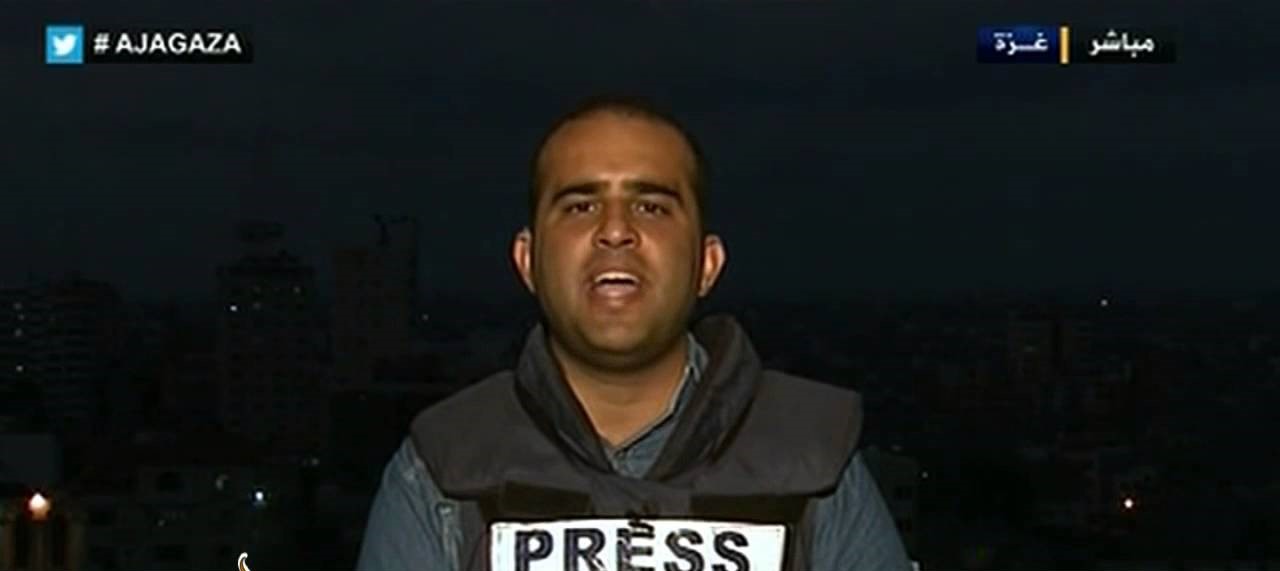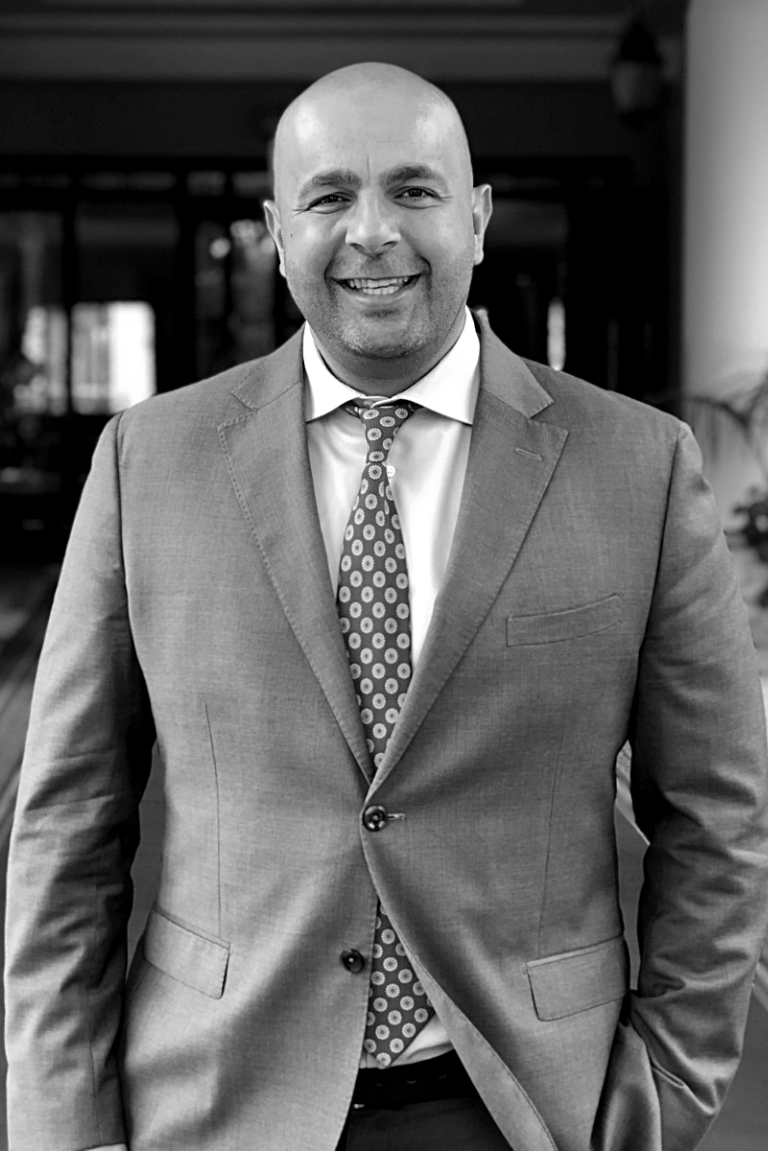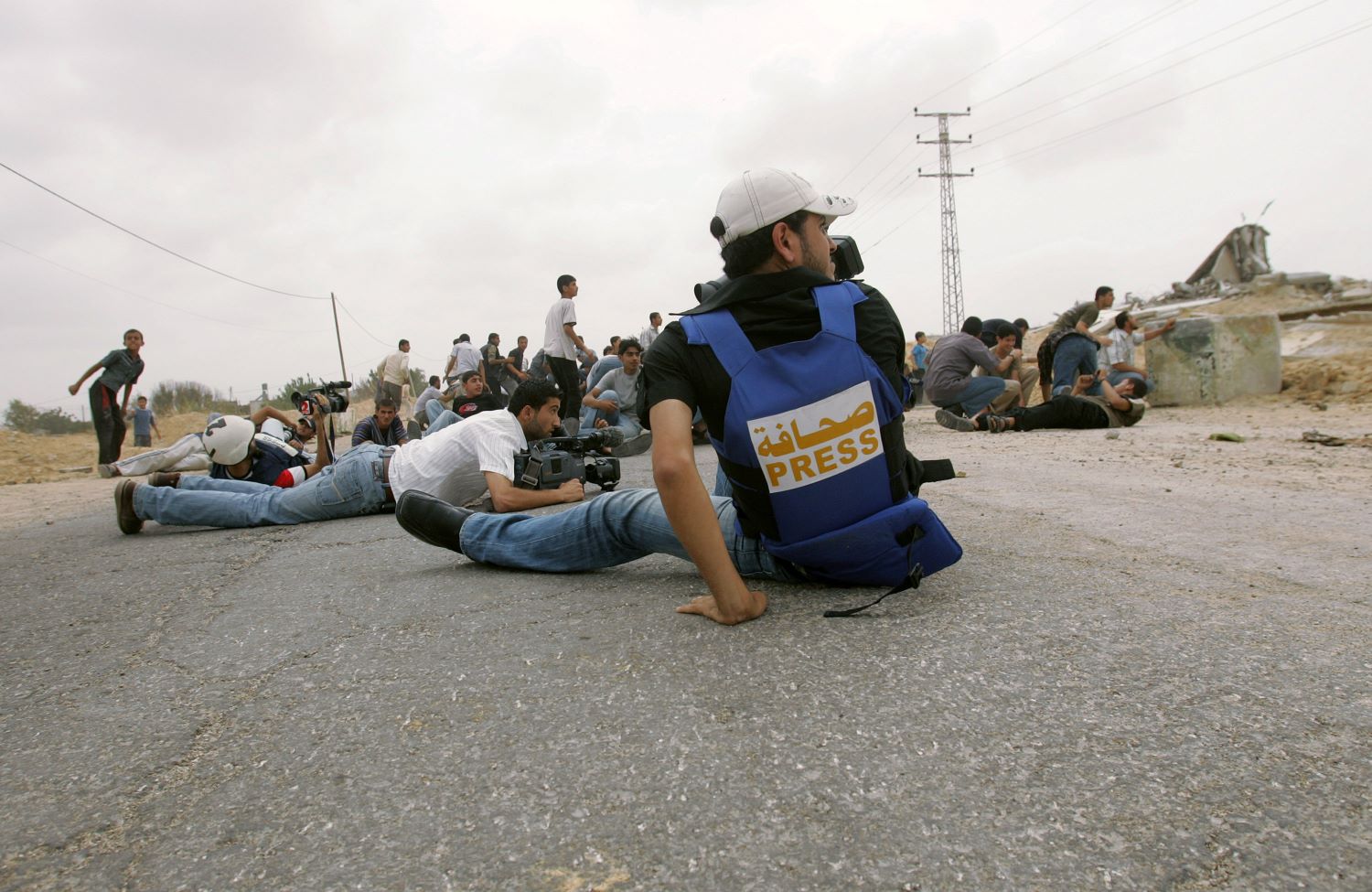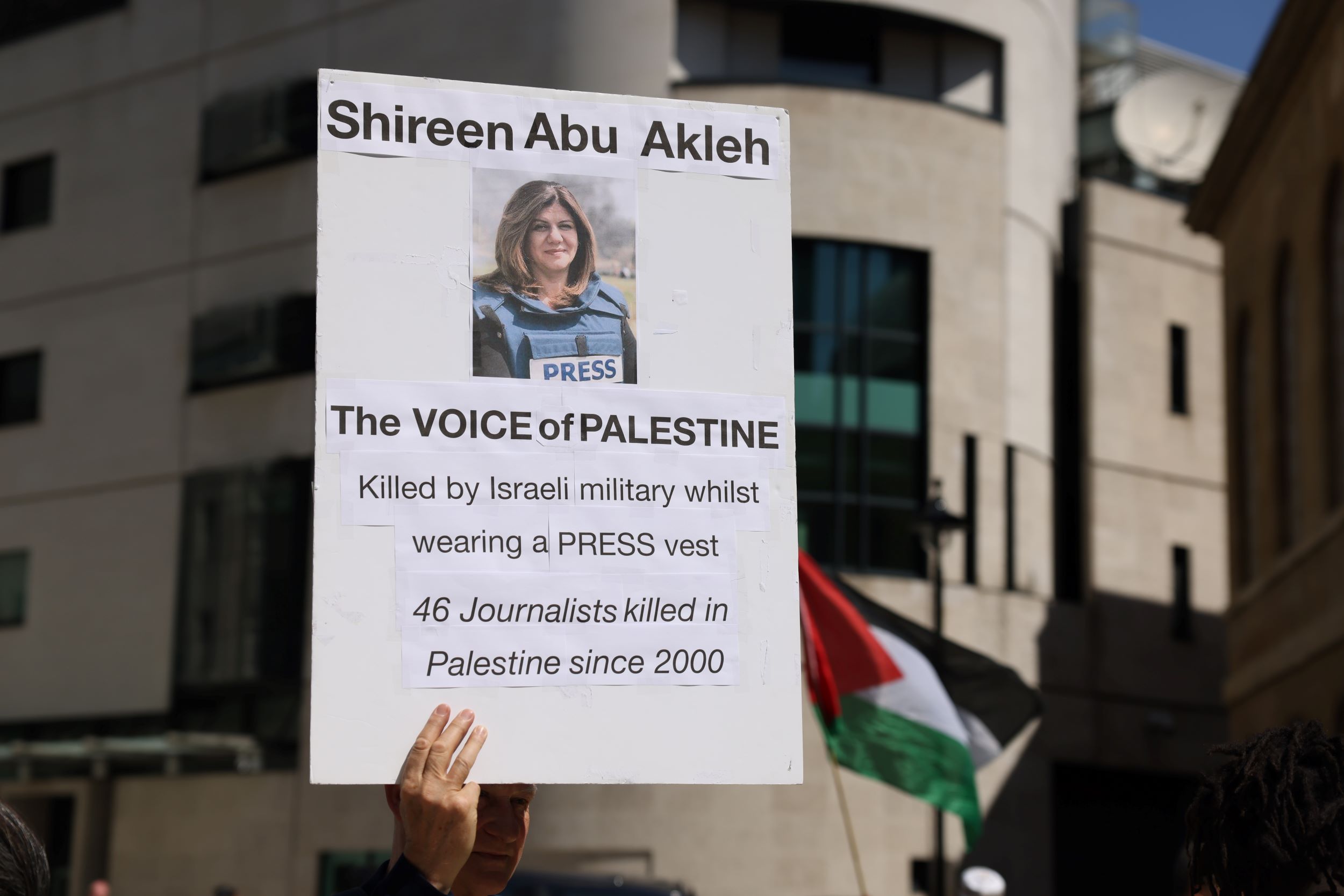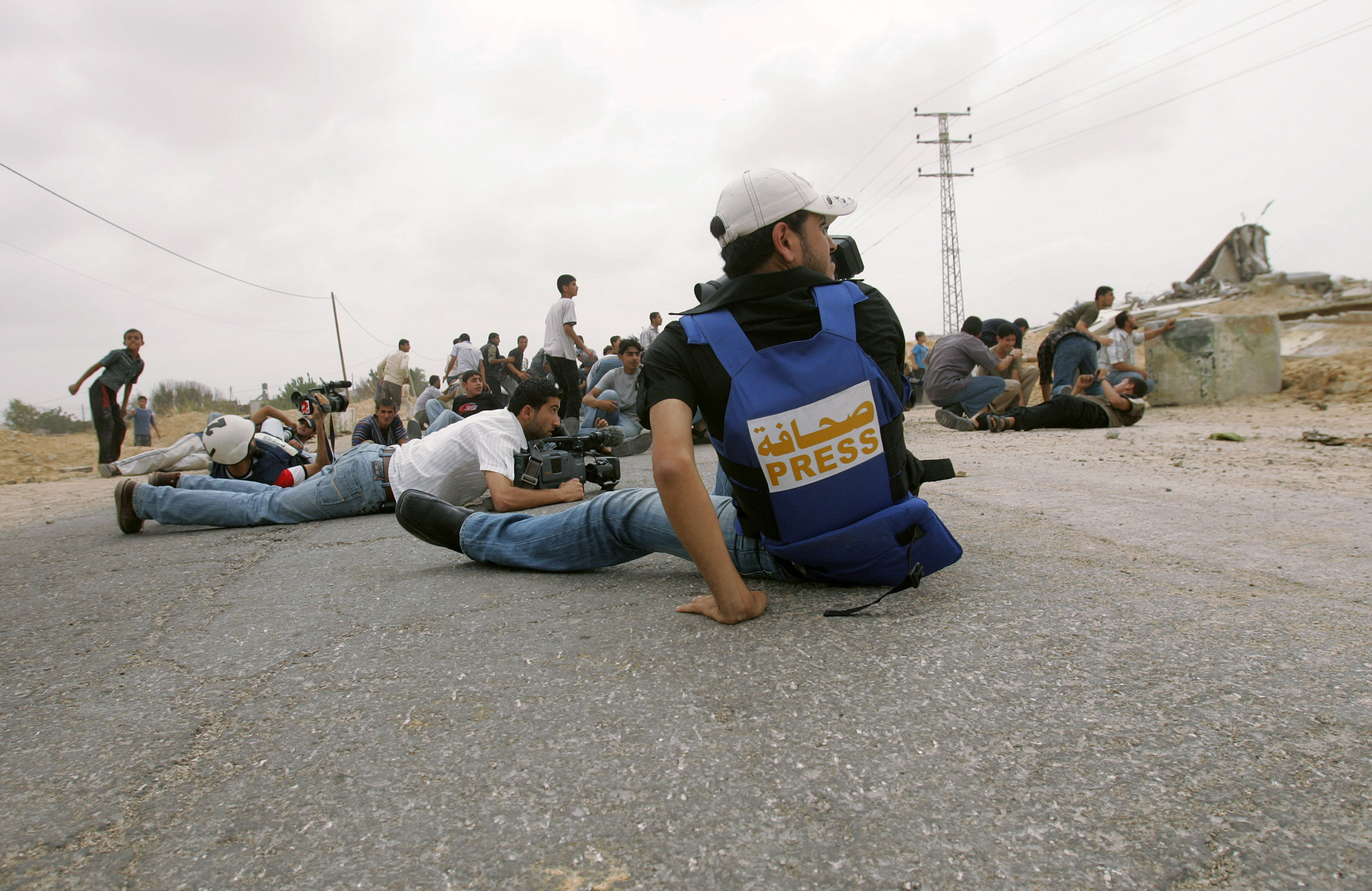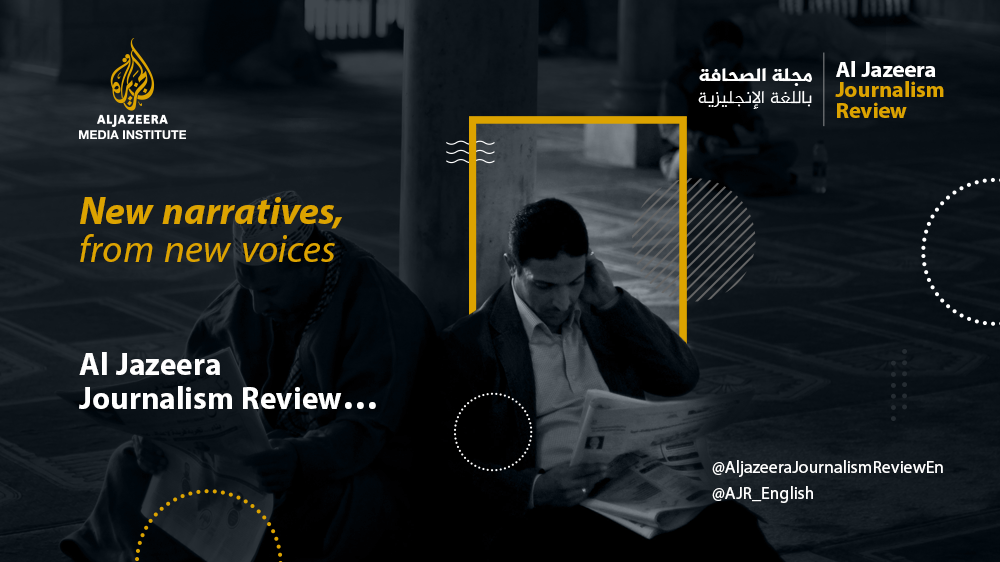This article was originally written in Arabic and has been translated into English with the assistance of AI tools and edited to ensure clarity and accuracy
Every day here is a turning point; every moment, every step outside the house could mean returning safely—or not. A journalist may be injured or arrested at any time.” This statement by journalist Khaled Bdeir succinctly captures the harsh reality of practicing journalism in the West Bank, particularly after October 7.
In 2002, Mohammed Al-Atrash was a child in his hometown of Hebron, in central Palestine, when then-Israeli Prime Minister Ariel Sharon gave the green light for Operation Defensive Shield in the West Bank. His home was among those besieged in the city for two months, repeatedly raided by Israeli forces, during which Al-Atrash was beaten and assaulted by soldiers.
Today, Mohammed Al-Atrash, now a reporter for Al Jazeera, moves between towns in the northern West Bank, documenting the events of the Israeli military's Summer Camps operation. He records the testimonies of people in besieged camps, vividly recalling his own experience as a child in Hebron 22 years ago. "I know exactly what it means to be in a besieged military zone, and that only deepens my sense of responsibility to report the truth," says Al-Atrash.
The military operation, described by the Israeli authorities as the largest since Defensive Shield, began at dawn on Wednesday, August 28, 2024. It involved attacks on the cities of Jenin, Tulkarm, and Tubas, along with towns in the northern occupied West Bank, under the pretext that the situation there had become a "serious security concern" for Israel. This escalation has further complicated the challenges faced by journalists covering the events and carrying out their work.
Mohammed Al-Atrash, now a reporter for Al Jazeera, moves between towns in the northern West Bank, documenting the events of the Israeli military's Summer Camps operation. He records the testimonies of people in besieged camps, vividly recalling his own experience as a child in Hebron 22 years ago. "I know exactly what it means to be in a besieged military zone, and that only deepens my sense of responsibility to report the truth," says Al-Atrash.
The Road to the North
A day before the military operation began, 33-year-old Mohammed Al-Atrash decided to take a break from work and travel from Nablus to Hebron to see his wife, celebrate his daughter Salma’s birthday, and help prepare her and her siblings for the upcoming school year. Half an hour later, however, he received an urgent message instructing him to head north immediately. Israeli forces had simultaneously infiltrated Jenin, Tulkarm, and Tubas, marking the start of a military operation. “I wanted to stay with my children, but that desire felt secondary because the whole country is at war, and many people are paying a heavy price,” he said.
Al-Atrash traveled from Hebron in the south to the outskirts of Jenin in the north. He first tried entering the city from the southern entrance but found Israeli forces stationed there. He then attempted to enter from the western side but encountered another roadblock. After an hour and a half of navigating alternative routes, he finally managed to access Jenin through detours leading into the city.
I wanted to stay with my children, but that desire felt secondary because the whole country is at war, and many people are paying a heavy price
Palestinian journalists in the West Bank face immense challenges in accessing information, sources, and event locations. When an area is subjected to military operations, Israeli forces typically seal off its entrances, besiege its residents, and disrupt communication and internet networks. Since October 7, 2023, the number of Israeli checkpoints between Palestinian cities and villages in the West Bank has risen from approximately 500 to at least 710, with some estimates suggesting the figure exceeds 840 when including gates, dirt mounds, and concrete barriers.
For instance, traveling between Jenin and Tulkarm—a journey that should take about 30 minutes by car—can now take two to three hours due to these military checkpoints. According to Khaled Bdeir, a reporter for Al-Ghad channel, the journey itself has become “an adventure and a risk.” Israeli forces routinely stop journalists’ vehicles at checkpoints, subject them to thorough searches, and interrogate them with questions such as, “Where are you from? Where are you headed? What do you do? Who do you work for? What are you filming?”
Palestinian journalists in the West Bank face immense challenges in accessing information, sources, and event locations. When an area is subjected to military operations, Israeli forces typically seal off its entrances, besiege its residents, and disrupt communication and internet networks.
Bdeir, 35, lives in Tulkarm in the northern West Bank and frequently travels between the areas targeted by the Israeli military operation. Each morning, he must monitor developments in towns, villages, camps, and military vehicle movements—a routine that leads to long-term psychological exhaustion. “Sometimes I ask myself, how does a journalist outside Palestine start their day? Do they wake up at 5 a.m. like we do? What does their daily schedule look like in a country without military raids?”
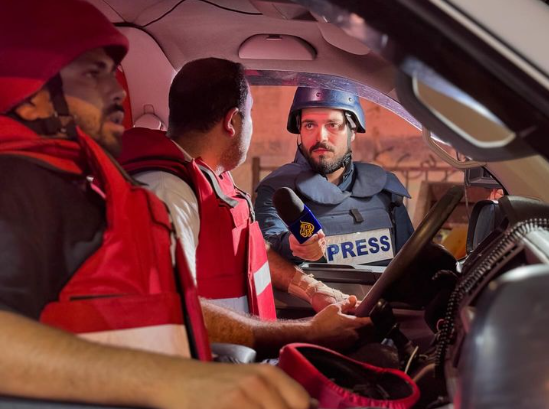
Targeted Journalism
One of the most alarming developments Palestinian journalists have faced since October 7 is the shift in Israel’s rules of engagement. On September 12, two UN human rights experts issued a joint statement condemning the violence, harassment, intimidation, and obstruction of journalists working in the occupied West Bank. "It is deeply troubling to see Israeli soldiers in the West Bank display the same disregard for journalists’ safety as they do in Gaza, in flagrant violation of international law," the statement noted.
The report highlighted at least three incidents in September alone—in Jenin and Tulkarm—where Israeli forces fired live ammunition at journalists or their vehicles during coverage of military operations. Since August 27, journalists have been barred from performing their work and forced to leave areas under threat from the Israeli military. Many reported being pursued by military bulldozers operated by Israeli security forces.
On September 2, Bdeir, accompanied by a group of journalists, headed to Cinema Roundabout in Jenin camp to document the movements of military bulldozers. Israeli forces fired shots from the windows of the bulldozers over the journalists’ heads, injuring AFP cameraman Ronaldo Schemidt with shrapnel in his right hand and Al Jazeera correspondent Shatha Hanaysha with shrapnel to her head.
The journalists then dispersed into different areas. Bdeir and his team moved to Abu Bakr Street, where they continued to be targeted by live fire until they were out of range. Later that day, armored bulldozers repeatedly attempted to ram them as they retreated, forcing them to take cover in a commercial building. One bulldozer struck a column of the building, leaving Bdeir thinking, “Either the bulldozer will collapse the building on top of us, burying us alive, or the soldier will shoot us. Either way, the result is death.”
Bdeir, accompanied by a group of journalists, headed to Cinema Roundabout in Jenin camp to document the movements of military bulldozers. Israeli forces fired shots from the windows of the bulldozers over the journalists’ heads, injuring AFP cameraman Ronaldo Schemidt with shrapnel in his right hand and Al Jazeera correspondent Shatha Hanaysha with shrapnel to her head.
Bdeir notes that press vests, which are supposed to identify and protect journalists as neutral parties, have become targets for Israeli forces in the West Bank. “There are no regulations holding Israeli soldiers accountable,” he explains. "For journalists here, every day, every moment, every time you leave your home is a critical juncture—you might return, or you might not. You could be shot or arrested."
A Climate of Impunity
Al-Atrash himself narrowly escaped gunfire when Israeli soldiers targeted him and his Al Jazeera team near Al-Amal Hospital in Jenin. While covering ongoing events, they were unable to document or trace the gunfire. “When the Israeli army is annoyed by journalists, they sometimes fire at them directly or issue warning shots,” says Al-Atrash. In Jenin, he witnessed Israeli soldiers shoot at two press vehicles heading to cover updates on a besieged house, injuring his colleague, journalist Mohammed Mansour, in the hand and wounding three other journalists.
The Palestinian Center for Development and Media Freedoms (MADA) has highlighted how successive Israeli governments have fostered an environment of impunity for soldiers, emboldening the repression of journalists and media freedoms in the occupied territories. This lack of accountability has allowed the systematic targeting of journalism and the erasure of documentation.
MADA’s monthly reports show that Israeli violations of media freedoms in Palestine surged in September, exceeding 140 documented incidents, compared to 104 in August. These included 132 violations in the West Bank and 8 in Gaza, among them three killings of journalists.
Personal Risks and Family Reassurance
The mounting risks Al-Atrash faces have led him to take extra precautions to reassure his family and reduce their fears. He frequently grapples with whether to disclose being shot at live on air or keep it to himself to avoid alarming them. “The dangers journalists face are immense, so I try my best not to transfer those fears to my family,” he says. He avoids contacting his family while in high-risk areas, always assuring them he is in relatively safe zones. He also refrains from sending videos containing gunfire sounds and removes his press helmet when speaking to his children to reassure them.
Similarly, Bdeir’s wife constantly urges him to be cautious and stay in safe areas, often reminding him, “Your son, Jihad, is waiting for you to come home.” Despite adhering to all safety measures, such as wearing protective gear and staying in relatively secure locations, Bdeir acknowledges that these precautions mean little against an unregulated Israeli soldier. “All these measures are worthless in the face of a soldier who can end it all with a single bullet,” he says.
Journalism Amid Siege
Another significant challenge Palestinian journalists face is accessing information and hearing firsthand accounts from those directly affected. This often puts journalists in a dilemma between risking entry into besieged areas or staying in safer locations to ensure continued coverage. Al-Atrash reflects, “It’s better for a journalist to remain in a safe zone to maintain the continuity of coverage.” Nevertheless, despite the risks, journalists strive to be present at the scene, knowing their presence can deter crimes against civilians. “When cameras are around, an Israeli soldier thinks twice; an empty area is very different from one being documented,” he explains.
Al-Atrash recalls the three-day siege of Jenin’s eastern neighborhood, during which journalists were barred from entry. A video later emerged showing the killing of a deaf elderly man by Israeli forces, who left him to bleed to death before running over his body with a military vehicle. “My belief in the importance of telling these stories drives me to connect with anyone inside besieged areas, as these narratives will vanish if they’re not told,” he says.
In such situations, journalists must rely on residents of the camps for information. Al-Atrash recounts contacting a resident in Jenin’s Al-Damaj neighborhood to monitor army movements. However, poor communication networks and power outages frequently disrupted their calls. “He would talk to me for two minutes before the connection dropped or his phone ran out of battery,” Al-Atrash explains.
Similarly, during military incursions, Bdeir focuses on documenting the humanitarian plight of besieged families, including shortages of water, food, and basic necessities for children and the elderly. He works to amplify their appeals through contacts with organizations like the Red Cross, the Palestinian Red Crescent, and youth initiatives to break the siege and deliver essential supplies, such as bread, water, and baby formula.
No matter how hard a journalist tries to remain neutral, they are still a son or daughter of their country, and everything happening here inevitably impacts them psychologically
The Psychological Toll on Palestinian Journalists
Journalists in Palestine face immense psychological pressure, says Bdeir, as they bear witness to the most harrowing realities—mothers saying farewell to their children, children losing their eyes or limbs, and a homeland consumed daily by Israeli incursions. "No matter how hard a journalist tries to remain neutral, they are still a son or daughter of their country, and everything happening here inevitably impacts them psychologically," he explains. While opportunities for psychological relief are limited, he believes they are essential for maintaining resilience and continuing their work.
Bdeir copes with the pressures of covering events in northern West Bank by creating moments of relief with his colleagues in the field. “Sometimes, after finishing our news report, we gather, share a funny story, or crack a joke. The goal is to make space for some relaxation,” he says. The intensity of the news cycle in the northern West Bank, where nightly raids are almost a given, makes these moments critical. Without the ability to decompress or shield themselves from stress, “they’ll kill us mentally before they kill us physically—and that’s even worse.”
Even traveling long distances on circuitous routes to avoid military checkpoints becomes, for Bdeir, an opportunity to unwind, meet new people, and explore different parts of the country. "The important thing is not to let the occupation achieve its goal of breaking me—first as a Palestinian, then as a journalist."
Journalists in Palestine face immense psychological pressure, says Bdeir, as they bear witness to the most harrowing realities—mothers saying farewell to their children, children losing their eyes or limbs, and a homeland consumed daily by Israeli incursions.
Each day, Bdeir returns to his home in Tulkarm, hoping to spend time with his son, help him with his studies, sit with his mother, or go out with friends. Yet, his time is always tethered to his phone and the unfolding events in the north. Israeli military raids on towns and camps often occur at night, and he may be called upon to cover them at any moment. “These sudden events and emergencies deprive you of much-needed stability,” he says.
Journalism Behind Bars
At the start of the Gaza war, Mohammed Al-Atrash, like many other journalists and activists in the West Bank, was arrested on charges of incitement and producing media content about Palestinian resistance in the West Bank. "The interrogator told me verbatim: ‘We were waiting for October 7 so Israel could operate without law, bring you here, and crush you,’" Al-Atrash recalls. He was released after seven months, during which he came to fully understand the level of surveillance imposed by the Israeli occupation on journalists and their work. "I became much more cautious, even on live broadcasts, carefully choosing my words to avoid being arrested again," he says.
Since October 7, the Palestinian Prisoners’ Club has documented 112 cases of journalist arrests. Of these, 59 remain in detention across the West Bank, Gaza, and Jerusalem, including 6 female journalists and 22 from Gaza. At least 16 journalists are being held under administrative detention without trial or charges.
In 2023, the Committee to Protect Journalists recorded the imprisonment of 17 Palestinian journalists by Israeli authorities, the highest number of journalist arrests in the Palestinian territories since the committee began tracking in 1992. These figures were surpassed in 2024, marking an unprecedented escalation in the targeting of journalists.
Suppressing Journalism
The Palestinian Center for Development and Media Freedoms (MADA) attributes the sharp increase in journalist arrests to the ongoing war on Gaza, which began on October 7, 2023. One of the war’s consequences has been the intensified suppression of freedoms in both Gaza and the West Bank, albeit with some variation. While Gaza has seen an unprecedented rise in journalist killings, the West Bank has experienced a surge in journalist arrests aimed at silencing their voices and preventing them from fulfilling their professional and journalistic duties.
Since October 7, Israeli authorities have also implemented punitive measures against Palestinian prisoners in their jails. These practices, documented by the Israeli human rights organization B’Tselem under the title "Welcome to Hell," include systematic, widespread torture by Israeli soldiers. Al-Atrash himself confirms this, recounting how he was subjected to numerous forms of humiliation, mistreatment, beatings, and even a dislocated shoulder during his detention.
Harassment in All Forms
The Israeli occupation is not the only obstacle faced by journalists in the West Bank; settlers also play a significant role in assaulting and restricting their work. While Palestinian journalists are cautious around Israeli soldiers, their fear of settlers is even greater due to the settlers’ access to weapons, lack of discipline, and disregard for rules of engagement. Furthermore, settlers enjoy complete impunity. As one journalist explains: “I might drive into an area where the army is present and face some level of harassment, but it’s unthinkable to go anywhere near settlers.”
Settlers deliberately photograph journalists and share their images in private groups, often adding sniper scope graphics as a direct incitement to target them. According to Mohammed Al-Atrash, this has led to the arrest of numerous journalists since October 7, as part of efforts to fulfill the demands of settlers. On October 13, Khaled Bdeir and his cameraman were attacked by a settler while covering olive harvest activities in the village of Ramin near Tulkarm. The settler attempted to break their camera and confiscate it after it captured footage of him assaulting a farmer and expelling him from his land. Villagers intervened to protect Bdeir and his colleague, helping them withdraw safely.
Despite the myriad challenges, support for Palestinian journalists remains scarce, both locally and internationally. Al-Atrash points out that the Palestinian Journalists’ Syndicate limits its role to documenting violations without taking effective action on the ground. “As a Palestinian journalist, I’ve never felt the syndicate’s presence—before October 7, after it, or even during military operations,” he says. Al-Atrash also criticizes the international and human rights organizations meant to defend journalism, describing them as "hollow balloons filled with slogans." Bdeir adds that the war has “swept away” all the principles they were taught about international journalism. "Everything we studied was just ink on paper—it hasn’t prevented the killing of journalists or provided them with protection."
Institutions Under Fire
Journalists have not been the sole targets of Israeli suppression; numerous Palestinian and Arab media institutions have also faced crackdowns. The latest example was the closure of Al Jazeera’s office in Ramallah on September 22, for a period of 45 days. Israeli forces broke down the office’s main door and delivered the staff an order to cease operations.
Similarly, Al Jazeera’s Jerusalem office was closed on May 5, following an order by the Israeli Minister of Communications to confiscate all the office’s equipment. On August 11, the Israeli government banned the Lebanese Al-Mayadeen channel, prohibiting its crews from operating.
These closures came after the Israeli Knesset (parliament) passed a law known as the "Foreign Entities Security Threat Prevention Act," which permits shutting down media outlets under the pretext of harming state security. Additionally, the Palestinian media company J-Media announced its shutdown on October 16, 2023, after Israeli authorities labeled it an “illegal organization” and handed it a closure order. The company had already been operating without a headquarters for two years due to its office in Ramallah being closed by the Palestinian Authority. Previously, Israel had shuttered other Palestinian and Arab television channels, including Al-Aqsa in 2015, Palestine Today in 2016, and Al-Quds in 2018, raiding their West Bank offices and the companies that provided services to them.
A Mission of Humanity
Despite these adversities, Mohammed Al-Atrash, Al Jazeera’s correspondent, continues traveling between towns and villages in the northern West Bank, driven by a commitment to telling the stories of its residents and humanizing their struggles. He believes this approach helps keep the Palestinian cause alive and fosters genuine empathy, in contrast to decontextualized news that desensitizes people to the gravity of events. “I don’t want to be just a number, and what applies to me applies to others. If I were martyred, I’d want people to know I went to this place out of professional responsibility, with a family and children I dearly love,” he says.
In Tulkarm, Khaled Bdeir of Al-Ghad returns home each evening, grateful for surviving another day—not because the coverage or raids have ended, but because he sees his son rushing down the stairs to greet him. “That’s when I know I’ve survived another day.”

